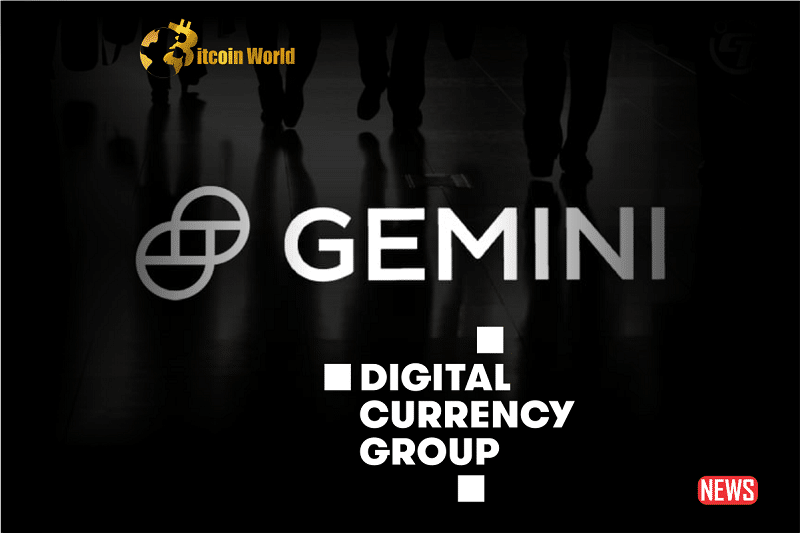The gloves are off in the crypto world as Gemini, a major cryptocurrency exchange, ramps up its fight against Digital Currency Group’s (DCG) proposed bankruptcy plan. Gemini isn’t mincing words, accusing DCG of trying to lowball Genesis creditors and lure them into a raw deal. Think of it as a high-stakes poker game, but instead of chips, we’re talking about potentially millions of dollars owed to creditors of the bankrupt crypto lender, Genesis. Let’s dive into what’s fueling this escalating conflict and what it means for everyone involved.
What’s Gemini’s Beef with DCG’s Bankruptcy Plan?
In no uncertain terms, Gemini believes DCG is attempting to pull a fast one. According to recent court filings, Gemini is arguing that DCG’s bankruptcy plan is a thinly veiled attempt to pay Genesis creditors less than they are rightfully owed. They’re calling DCG’s tactics “contrived, misleading, and inaccurate assertions,” suggesting DCG is deliberately trying to confuse creditors.
Gemini’s core argument is crystal clear:
- Underpayment Allegations: Gemini claims DCG’s plan is designed to benefit DCG disproportionately by significantly underpaying Genesis creditors.
- ‘Bait and Switch’ Tactics: They’ve directly accused DCG of trying to “bait” Genesis creditors into accepting a deal that is far less favorable than what they deserve.
- Protecting Customer Assets: Gemini insists its opposition is solely focused on maximizing the recovery of assets for its customers who were impacted by the Genesis fallout.
Essentially, Gemini is positioning itself as the champion for Genesis creditors, fighting against what they see as DCG’s attempt to exploit the bankruptcy process for its own gain.
Why is Gemini So Adamant About a ‘Just and Adequate’ Payment?
Gemini’s stance is rooted in a commitment to its users and a belief that DCG has the means to offer a better deal. They are pushing back against what they describe as a “starve them out” strategy from DCG. Gemini firmly believes there’s more value to be extracted from DCG for the Genesis creditors. They are not backing down, signaling a protracted legal battle ahead.
What Exactly Are the Creditors Owed?
This isn’t just about vague accusations; there’s real money on the line, and real delays in repayment. Court documents reveal a concerning situation:
- Unpaid Loans: Genesis creditors are still waiting for payments on loans that matured way back in May.
- Significant Sum: The total amount of these outstanding loans is estimated to be around $630 million.
- Mounting Tension: This payment delay is undoubtedly fueling the fire in the already tense relationship between Gemini and DCG.
Imagine being owed a substantial amount of money and facing continued delays and a bankruptcy plan that feels like a slap in the face. This is the reality for Genesis creditors, and Gemini is amplifying their concerns.
Gemini vs. DCG: A Timeline of Escalating Conflict
This dispute isn’t new; it’s been brewing and intensifying over time. Let’s recap some key moments that led to the current standoff:
| Date | Event | Significance |
|---|---|---|
| October 2022 | Gemini considers discontinuing the Earn program. | This marks the early stages of concern regarding Genesis’s financial health. |
| July 7 (Recent) | Gemini initiates legal action against DCG and Barry Silbert. | Legal battle officially begins, escalating the public conflict. |
| August 31 (Recent) | Gemini raises concerns about the lack of clarity in DCG’s bankruptcy plan. | Formal objection to the plan, highlighting procedural and informational gaps. |
| Recent Court Filings | Gemini intensifies criticism, accusing DCG of misleading tactics and underpayment attempts. | Current peak of the conflict, with strong public accusations and legal maneuvering. |
Winklevoss vs. Silbert: A Personal Dimension?
The conflict isn’t just between companies; there’s a personal element too. Gemini CEO Cameron Winklevoss has directly accused DCG founder Barry Silbert of deceptive conduct. Winklevoss alleges that Silbert convinced Gemini to continue the Earn program even when he was aware of Genesis’s precarious financial situation back in October 2022. These are serious accusations that add another layer of complexity and animosity to the legal fight.
What’s Next for Genesis Creditors and the Crypto Industry?
The ongoing battle between Gemini and DCG is far from over. The cryptocurrency community is watching closely because the outcome will have significant repercussions:
- Creditor Recovery: The primary concern is the extent to which Genesis creditors will recover their lost assets. Gemini’s fight is crucial in determining this outcome.
- Industry Confidence: This case highlights the risks within the crypto lending space and the importance of robust bankruptcy procedures. The resolution could impact investor confidence in the broader crypto market.
- Regulatory Scrutiny: High-profile disputes like this often attract regulatory attention, potentially leading to stricter rules for crypto lending platforms in the future.
In Conclusion: A Crypto Showdown with High Stakes
The Gemini vs. DCG saga is a critical juncture in the ongoing evolution of the cryptocurrency industry. It’s a battle for fairness, transparency, and accountability within the often-turbulent crypto landscape. As Gemini continues to challenge DCG’s bankruptcy plan, the crypto world waits with bated breath to see who will prevail and what lessons will be learned from this high-stakes legal drama. One thing is clear: the fight for Genesis creditors is far from over, and Gemini is determined to keep pushing until they believe justice is served.
Disclaimer: The information provided is not trading advice, Bitcoinworld.co.in holds no liability for any investments made based on the information provided on this page. We strongly recommend independent research and/or consultation with a qualified professional before making any investment decisions.




